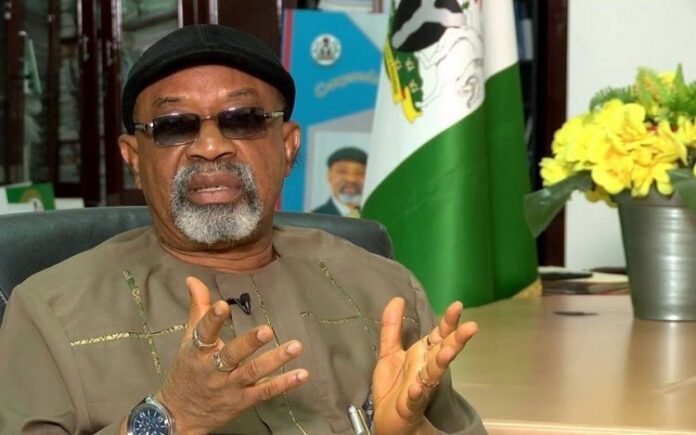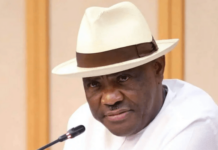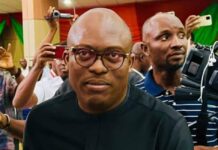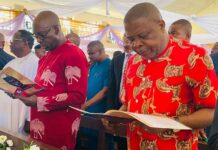Chris Ngige is the second serving Minister in the Muhammadu Buhari-led administration to officially declare his interest to run for the plum job
The Minister of Labour and Productivity, Dr. Chris Nwabueze Ngige, has officially declared his intention to run for the office of the president of the Federal Republic of Nigeria in 2023.
The minister, who was a governor of Anambra State and a former senator from the state made the declaration today 19th of April, 2022, at his Alor town.
Ngige, who said he joined the race because he has a burning desire to see a prosperous, united, and equitable Nigeria. becomes the second serving Minister in the Muhammadu Buhari-led administration to officially declare his interest to run for the plum job
According to Vanguard, Ngige, unveiled his presidential ambition before a mammoth crowd at St. Mary’s Catholic Church Alor, Idemili South local government area of Anambra State, seeking the ticket of his party, the All Progressives Congress, APC as its Presidential candidate.
Addressing the crowd, comprising APC faithful and other supporters, the former Anambra State Governor said having served 40 years in the public service, he was fully equipped as an administrator, with a huge wealth of experience, capacity, and energy as well as a large heart to accommodate the differences among Nigerians
ALSO READ: Gambari, Fashola, Ngige, others inspect 2nd Niger Bridge
Ngige who recounted his numerous achievements as a former governor, ex-Senator, and two-time minister, described himself as the “Jack of all trade and master of all” that Nigeria needs now.
He thanked the President for the opportunity offered him to serve as a minister, which he said broadened his knowledge of the various ministries, departments, and agencies,
being a member of the Federal Executive Council (FEC) and the conciliator of disputes between employers and employees in the various arms of government and the private sector.
According to him, his stewardship in the difficult and complex Ministry of Labour as the chief conciliator enriched his knowledge of the problems of workers, the difficulty the industrialists and entrepreneurs face, why industries close down, and why some run far below their installed capacity and in turn employ fewer hands.
He said, “I also know the unproductive areas and the areas of waste in the public service. I see the energy in labour that has not been properly harnessed. I have seen the low hanging fruits in agriculture, the handicaps, the factors that militate against job creation, which is one of the mandates of my ministry, especially the inter-ministerial and inter agencies cooperation that is missing. I have seen our burgeoning population without a corresponding advantage in terms of improvement in GDP.”
He said under his watch, the Labour Ministry has conciliated 1683 industrial disputes in the last seven years, 95 per cent done successfully in the ministry and its agency, the Industrial Arbitration Panel (IAP), while only about three per cent of the disputes went up to the National Industrial Court of Nigeria(NICN).
The minister said they took labour administration to a higher level in the international arena, where their labour diplomacy brought Nigeria back to the Governing Board (GB) of the International Labour Organisation (ILO) after ten years of absence.
He explained that Nigeria came in first as deputy (titular) in 2017, and is now a full regular member of the GB, having also been elected as the Chairperson of the Government Group, where he presided over the affairs of 187 countries of the ILO between 2019 to 2020.
“My dear friends, colleagues, and comrades, many would wonder that after serving seven years as Minister in one of the most difficult ministries of government, in a polity riddled with rising unemployment, bickering, and economic disputes between workers and employers, in a famished economy, Dr. Chris Nwabueze Ngige would have asked for a deserved rest.
“Yes, a deserved rest would have been okay for me as a person but the zeal, the burning desire in me to see a prosperous, united, and equitable Nigeria, where no man is oppressed, where there is no chasm between the haves and have not, would not allow me to go home and rest.”
“Today, as I sit back to ruminate on the state of our country, I find a country led by a patriot, good-hearted leader, Muhammadu Buhari, though greatly misunderstood especially in the South-Eastern part of Nigeria. Permit me to say that I want to get the nomination of our party and to stand on its manifesto to actualize and execute the programmes of the APC.
“Shall we say the APC as a party and as a government has failed? The answer is a big No. The three cardinal issues upon which Nigeria gave us a mandate in 2015 are infrastructure/economic development, security, and anti-corruption. In properly assessing this government and our programmes, it is important we start from where we met Nigeria in 2015. I don’t want to be one of those in the class of wailers, wallowing in self-pity. No! I want to be your ambassador so I can go and grow prosperity, and grow the resources that are needed for a big country like Nigeria.
“Truth be told, Nigeria has been in the years of the locust, starting from the 80s, 90s, the long period of military rule to 2015. Luckily, the leaves were all eaten away but the tree and the branches still stand.
“Yes I’m part of this administration, so I should know what the resources look like and I know what the challenges are. This is because I’m in the room and I’m privy to decisions taken. In scoring the administration, one can give us a pass, credit, or distinction in infrastructure depending on the assessor. But let me ask. Can you score a government that has invested massively in infrastructural development, built roads and bridges like Lagos -Ibadan-Ilorin Rd, 2nd Niger Bridge almost completed, and the reactivation of the rail system anything but distinction?
“You can also score us in security, again depending on the baseline – even though we know that the security deterioration is also linked to the economic situation of the country, which has stifled jobs while the population gallops by the day.”
Ngige said if he becomes President, the Nigerian Police, as the agency in charge of homeland security would be equipped with men and materials to function optimally, lamenting that attempts by the current administration to increase their men by 10,000 every year in the last five years were stifled by unnecessary bureaucracy.
According to him, the decentralization of the Nigerian police is the way to go, so that governors of states can be chief security officers in name and in reality
He added that the structure of the Nigerian police needs to change and mimic that of the judiciary which has worked well with the State judiciary and the federal arm in a handshake.
He said as a former governor and chief security officer of a state, he knows what to do and how to do it.
Ngige recalled that as Governor of Anambra State, he met N42b debt, schools closed for one year with teachers and civil servants owed for almost a year, doctors and health professionals on strike for eight months, and pensioners were treated as “dead woods.”
“I met dilapidated infrastructure, with hopelessness and despair written on the faces of the people of Anambra State. The judiciary was also neither equipped nor energized to do its work. Importantly, I turned all these into history as I cleared the arrears of salaries, and pensions, as well as paid off genuine creditors. I and my team rejuvenated the civil service. We further introduced knowledge-based promotion through examination. Under our administration, 500km of roads across all senatorial zones were built in 30 months, unprecedented in the history of the State. Handled by the best contractors, these roads still stand like the Rock the of Gibraltar, 16 years after. Anambra then became a metaphor for solid roads under the slogan of Anambra People’s Money at work!”
The presidential hopeful assured that if elected President, he would deploy the resources belonging to Nigerians to the expansion of the infrastructure efforts of the current administration in roads, rail, air, and even inland waterways.
“Some persons have been feeding the public with wrong information that my office is to blame for the incessant strikes by labour unions. Here is an opportunity to explain my role as a conciliator. There is a misconception that the conciliator is also the man who will actualize and implement whatever is reached in an agreement. This is wrong. A conciliator is like an arbitrator and not the person who implements the agreement so reached. At most, he can do facilitation by persuasion for the parties to implement the agreement and that’s where the role stops.
“In the case of the university unions, it is important to make it clear that the Federal Government is not owing them salaries and wages rather, what is being owed is a carry-over of allowances (Earned Academic Allowances/Earned Allowances) from the past administration and that the carry-over is being paid in instalment, under a negotiated agreement. On one or two occasions the government defaulted for lack of revenue to pay, it was properly rescheduled.
“Unfortunately, detractors have told unions that Ngige is their problem. How can the Minister of Labour be their problem when he is not their employer? The Minister of Labour is neither a member of the Governing Council of universities nor the Minister of Education or Finance. The same goes for health workers and doctors. The government side and the fixers of salaries and wages met with them and told them what they are able to pay, which is an ILO principle of Negotiation – Capacity and ability to pay. Instead of following up with negotiations, they would turn around to blame the Minister.
“For example, ASUU invented a payment platform, called UTAS. UTAS has been subjected to necessary tests by National Information Technology Development Agency (NITDA) which said it cannot recommend the system for use, having passed the User Acceptability test, but failed the Integrity and Credibility test. ASUU said Ngige can do the magic, to force NITDA to clear UTAS and also force the Ministry of Finance to deploy it. This magic is beyond me. They ascribed the powers I don’t have to my office.
“However, conciliation and arbitration are within the ambit of my Ministry and we are doing whatever we can, including persuasion, and subtly moving into other ministries, to try to pressure them, in order to resolve some of the issues. I’m a concerned parent whose children are also in the public universities in Nigeria. In the Seventh Senate, I championed the cause of labour. How then can I turn around to stop the progress of these institutions? God forbid !”
Ngige urged the leaders of the university system to tell their members the truth about what is happening with UTAS at the NITDA as well as the re-negotiation of the 2009 agreement ongoing in the Ministry of Education, which ASUU has shunned.
He appealed to ASUU to reconsider its position and save the education sector in Nigeria.
He recalled that two labour centres in Nigeria, the NLC and TUC had on different occasions commended his stewardship in repositioning labour and engendering social dialogue, even as the Nigerian Medical Association and the Nigerian Association of Resident Doctors commended his efforts in resolving age-long challenges in the health sector, describing him as “a medical elder of repute.”
Earlier, the President of the National Forum for South-East Presidency, Patrick Enunekwu described Ngige as the most qualified among all the aspirants, saying his experience cuts across all the arms of government including the judiciary, which he worked with while serving as Governor
Enunekwu said the roads Ngige built over 17 years ago in Anambra State still stand the test of time.
Speaking in a similar vein, a former APC governorship aspirant in Anambra State, Kaodilinye Okelekwe extolled Ngige for his selflessness, determination, self-confidence, farsightedness, and good judgment, which are the characteristics of a good leader.
Also, the leader of the South-East APC Progressive Forum, Chukwudi Uba expressed trust in the ability of Ngige to restore security in Nigeria and revamp the economy to ensure a prosperous Nigeria where all citizens would enjoy the benefits of the resources of the country maximally.














